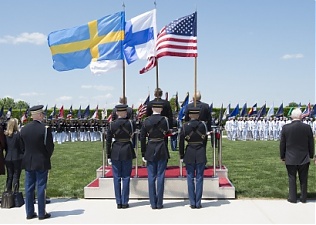Analytics, EU – Baltic States, Legislation, Modern EU, Security
International Internet Magazine. Baltic States news & analytics
Thursday, 19.02.2026, 06:21
“Total defense” alert from Sweden
 Print version
Print version |
|---|
About
5 million Swedish house-owners received in their post-boxes (in the morning of
May 28, 2018) a 20-pages leaflet titled “When crisis or war begins”. The brochure’s
idea is to prepare citizens in this non-allied country to a country’s new
military doctrine called “total defense”.
Danish
commentator, Peter Wivel in the
Danish daily Politiken (“Sweden
prepares for a critical time”, 28.05.2018, p.7) makes his explanation: the
booklet has been quite expected as the time for the next elections in September
is approaching and troubled governing socio-democrats would like in this way
“to assemble the nation”.
But
there is something else in the booklet, says P. Wivel: it is warning that a
possible war is inevitable. Therefore, citizens have to be prepared for a
troubled time…
The
Swedish message this time is connected to possible global/regional crisis as
well, first of all with climate threat and cyber attacks; the latter is even
more dangerous as it can make all electronic communications (on which the whole
nation is heavily dependent) disrupt and invalid.
To be prepared for bad times, Swedish people –this is what the leaflet suggests- have to make “emergency baskets” in each family for at least a week’s survival with necessary amount of food, water, medicine and, of course, cash, as dispenser machines would not work…
Suffice it to say that there is already a global “Cyber Security Index, NCSI”, which measures countries’ readiness against cyber attacks and crimes; the index includes every NATO and all EU states, as well as a number of developing countries. The e-Governance Academy in Tallinn updates the data on an ongoing basis as new information becomes available.
The ten countries best prepared presently against cyber attacks are: France, Germany, Estonia, Slovakia, Finland, Lithuania, Spain, the United Kingdom, Switzerland and the Czech Republic.
The Index can
be consulted at http://ncsi.ega.ee/
Distant past,
present and future threats
A
military alert of such dimension for the first time occurred in Nordic
countries, i.e. Sweden and Denmark in 1961: that time it was a threat of
nuclear crisis among the “great powers” in the world.
In
modern time, i.e. in January 2017 Swedish Defense Ministry warned the government
that the “situation” had deteriorated: the US’s new administration acknowledged
that America did not any more believe in the NATO’s concept and send a signal
that it would “turned away” from Europe.
The
Swedish defense ministry hinted on Russia’s leadership that can use “the
moment” and try to get back the territories lost during the collapse of the
Soviet Union. That idea was wholeheartedly supported by Sweden’s neighbors,
i.e. Estonia and, particularly, in Latvia with a great number of ethnic Russians
residing there. By the way, the European Commission has warned Latvian
government for long to resolve the so-called “Russian minority” issue (with
about 30-40% of the total population) but no radical measures have been taken.
Now, says the Danish columnist, “it might be too late” and added that people in
Denmark, specifically in Bornholm, could be very interested in the Swedish “warning
leaflet” as well...
The
“alarm” in earnest broke out in December 2017, as the US new administration
confirmed “a troubled message” to the European states to increase defense’s
impetus otherwise the US would “shed their doubts” in NATO’s principles and
mission. In winter 2017, the Swedish government assessed that if an
intervention occurs (?!), the military would survive “about three weeks”; hence
the country needs assistance from friendly neighbors.
Although,
there is no direct mentioning in the booklet of any country that can threaten
Sweden, the stress is on the need for a “stronger European security”. It sends
a clear message to countries in the Baltic Sea region that military
preparations shall be a priority in the months and years to come, generally at
the expense of average people’s wellbeing. Probably, in rich Nordic countries
the message could work as a “unifying” factor, but hardly in their less
“favorable” three Baltic States.








 «The Baltic Course» Is Sold and Stays in Business!
«The Baltic Course» Is Sold and Stays in Business!

